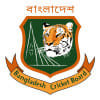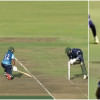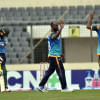Stumped by the system

Every year, the Dhaka Premier League (DPL) begins with unwavering commitments from authorities to make it even more competitive than the previous years.
The same is the case for the franchise-based Bangladesh Premier League (BPL) or any other domestic tournaments -- it is as if Bangladesh Cricket Board (BCB) officials read out lines from the same script, merely swapping out the tournament names.
And almost every year, the charade put on by BCB high-ups is exposed -- either through the quality of cricket displayed, the blatant mismanagement, or something as bizarre as what happened on Wednesday.
Shinepukur Cricket Club batter Minhajul Abedin Sabbir's manner of dismissal in a DPL game against Gulshan Cricket Club in Mirpur portrayed the exact state of Bangladesh cricket. It was symbolic of a system where those in charge appear to be intentionally holding back progress, allowing everything but cricket to soar.
Minhajul dragged his bat back, never apparently intending to ground it, despite having it over the crease. It was as if he allowed the wicketkeeper to take the bails off in his second attempt at having the batter stumped.
Bangladesh cricket's future, in every way, is in the hands of board president Faruque Ahmed. Questions are naturally raised about whether the Faruque-led BCB has been holding back, or even making attempts to obstruct, to place Bangladesh cricket where it should be -- much like Minhajul's puzzling behaviour at the crease.
Faruque's return to BCB -- now in a much more powerful role than when he previously served as chief selector -- followed a nationwide movement that promised significant change to various sectors.
Yet at BCB, the only noticeable change has been the signature at the bottom of approved documents.
Since Faruque's arrival, the country's cricket has seen no meaningful progress. BPL's most recent edition was Faruque's opportunity to finally deliver on the big promises of "increased competitiveness", "quality cricket", and "strict regulations". But like in the years before him, those promises fell flat as BCB offered one of the most chaotic editions in history, marred by widespread complaints from players and officials regarding non-payment, starting from the very first day.
Under the Faruque-led administration, DPL has presented an even bleaker picture. Issues from BPL -- like non-payment and protests over irregularities -- spilled over, further compounded by the latest addition of a sombre chapter that reeks of foul play on the field, described as "shameful" by several former cricketers.
Arranging and safeguarding the integrity and quality of both BPL and DPL should be routine tasks for the governing body of cricket in Bangladesh. That the board has failed to oversee even one smooth, controversy-free domestic tournament since the leadership change is perhaps unsurprising. BCB's primary focus remains on the national men's and women's teams.
But, even in such a small domain, Faruque and company have failed to bring any visible change in structure or the way things are operated in and around the national teams.
The board may consider itself unlucky that Minhajul's suspicious act did not go unnoticed -- unlike the many misdeeds that go unreported in lower-tier tournaments. It is nothing new that allegations of corruption, to the extent of paying off umpires, are rampant in the lower-tier cricket, which, unlike DPL or BPL, do not get televised, helping the wrongdoings fly under the radar.
For now, BCB has initiated an investigation into the alleged irregularities in the said DPL game, with the board reminding through a press release yesterday that it had taken "notes of the concerns surrounding the game".
Will the investigation bear any fruit?
Fortunately for BCB, the focus will soon shift. In a few days, Bangladesh men's national team will host Zimbabwe for a two-Test series. As is customary in Bangladesh cricket, media and fan attention will move towards international fixtures, and scrutiny over DPL and other domestic cricket issues will recede -- eventually to be swept under the rug.
However, if and when the national team fail to perform, questions about the overall quality of cricket will re-emerge, the dearth in the pipeline will be brought to the fore, and replacements for the retired stars will be sought with more gusto than ever.
The irony, as it has long been the case, will be in the way everyone would no longer talk about the main devil and the root cause of agony in Bangladesh cricket -- that is the corruption at the core that never gets properly investigated, regardless of who holds the reins at the board.

 For all latest news, follow The Daily Star's Google News channel.
For all latest news, follow The Daily Star's Google News channel. 










Comments